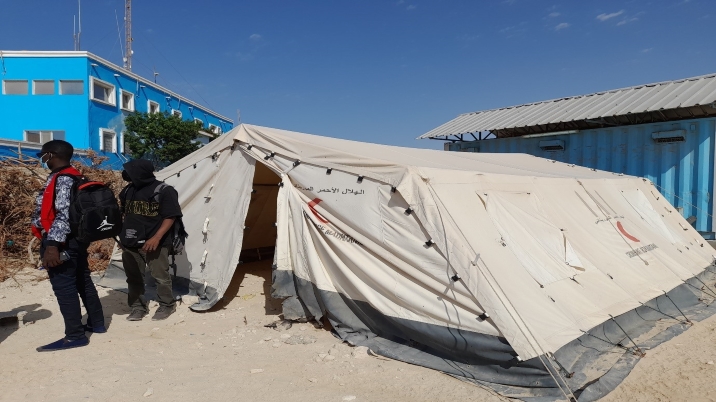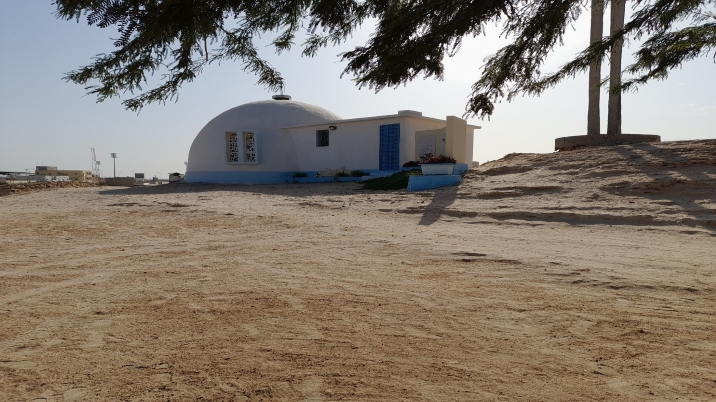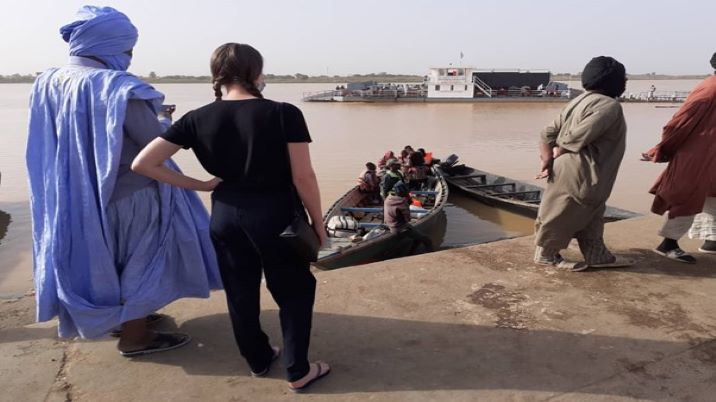Desperate journeys – migrants’ stories from Mauritania
When Helene Blensted from our International team visited Mauritania, she heard powerful stories from people forced to leave their homes.
Last updated 25 April 2023
In West Africa, people are forced to migrate for a multitude of reasons – extreme poverty, lack of job opportunities, violent conflict, and climate change causing recurrent disasters in their communities. Simply put, migration is their last hope to provide healthier and safer lives for themselves and their families.
In recent years, more and more migrants have been travelling through Mauritania and towards the Canary Islands, in order to reach Spain and the EU. Most migrants have travelled through Turkey to Greece or via Libya to Italy, but these routes have become increasingly difficult and dangerous. Mauritania, a country sitting between Morocco and Senegal, is therefore seen as a “safer” option, but this new route is in no way risk-free.
In 2021, around 22,500 migrants were detected crossing the sea from the West African coastline to the Canary Islands. Over 1,100 of these migrants died at sea. While these are only the deaths that we know about, the number is estimated to be much higher.
During my visit, we met with the Mauritania Red Crescent, the International Organisation for Migration (IOM), the United Nations High Commissioner for Refugees (UNHCR) and other humanitarian organisations who work with migrants in Mauritania. And we also met the migrants themselves who told us their stories, tears running down their faces, and my heart would hurt for them.
I am well aware of the difficulties, the abuses and the dangers that migrants encounter trying to reach safer countries and provide better futures for their families. I understand why they decide to take these risks and I know what happens to those who never reach their destination. But knowing is different from seeing with your own eyes and meeting the people portrayed in the media.

First aid tent at the harbour in Nouadhibou. Many migrants set out at sea from Nouadhibou, which is one of the most northern cities in Mauritania. When the Coast Guard rescue migrants off the shore, they are brought here and assisted by French RC and Mauritania RC.
I just want to go home.
In Mauritania’s capital, Nouakchott, the IOM and the Red Cross run a centre for vulnerable migrants. Migrants with nowhere to sleep can stay at the centre and receive psychosocial support to help them cope with the stress and trauma they have experienced on their journey.
Here, we met a young man from Guinea, who had lost both his parents in the Ebola outbreak. He must have been in his early 20s, maybe younger. In the wake of his parents’ death, he could not find work in his village and struggled to make ends meet. An uncle, who lived in Nouakchott, offered to help him and fund his studies in Mauritania, on the condition that the young man cover his own travel costs.
But once the young man reached Nouakchott, he found he had been tricked by his uncle. Instead of continuing his education, he was forced to work in the streets for no pay. He tried to escape the situation, to stand up to his uncle, but without money or any social network in Mauritania, he was out of options.
We met him living in the migrants’ centre and waiting for IOM to repatriate him back to Guinea. The trip had already been delayed for months because of Covid-19 and border closures. Just after our talk, he went to see one of the Red Cross staff members working in the centre – “Do you have a date yet? Can you please ask IOM when I can go home? I just want to go home”. He was crying.

Catholic church in Nouadhibou, close to the Moroccan border. The church is often sought out by migrants who have just arrived in the town and don’t know where else to go.
I haven’t heard from my brothers.
During our trip, we also visited the Catholic church, who are often the first point of contact for migrants, and can signpost them to other humanitarian organisations for support, as well as providing food and shelter for a few nights.
As we left the church in Nouadhibou, one of the most northern cities in Mauritania, we came across a middle-aged man. He was a migrant from Niger, and had come to see the priest, to ask for help – “I haven’t heard from my brothers. They left by boat weeks ago…”
His two brothers and their wives had left Nouakchott by boat two to three weeks earlier, and had not been heard from since. Not knowing whether his loved ones had reached their destination safely, the man was very worried.
Our Red Cross colleague took his contact details and referred him to the “Restoring Family Links” services of the Red Cross. This service helps look for missing people, determine their fate and if possible restore the contact between family members offering phone calls for example.
Many things could have happened to them. They could have lost their phones, or they might have been detained by the border police. They might have died at sea.
Sadly, family members often never get to know what happened to their loved ones who migrated.

Helene visiting the border crossing between Senegal and Mauritania with a colleague from the Mauritania Red Crescent.
Come quick, a boat with migrants has just been found
Early in the morning, on one of the last days of our visit in Mauritania, we received a phone call from a Red Cross colleague: “Come quick, a boat with migrants has just been found”. We rushed to the harbour in Nouadhibou to watch the operation.
The coast guard stops illegal migration and rescues migrants at sea. The coast guard informs the Red Cross, which sends staff and volunteers to the harbour. We provide vital first aid to migrants, sending critical cases to the hospital, along with psychological first aid, phone calls to their family, new clothes, shoes, food and water etc.
In all honesty, I was frightened as we drove to the harbour. We had no idea what we would see and had heard stories all week about how unwell migrants were after weeks at sea, drifting without food or water.
Fortunately, these migrants had only been on the water for a few days and all were in good shape. When we arrived, the migrants had changed into dry, warm clothes provided by the Red Cross, and were sitting calmly and eating while the Red Cross took note of the numbers and nationalities of the migrants.
While the migrants were relieved to be rescued from a boat with a broken engine, it was also clear that this was a huge failure for them. To board the boat, they will have paid a lot of money to smugglers – possibly up to a year or more of savings. All of that was now lost.
Depending on their nationality and status, the authorities will send them to neighbouring countries, where they will be dropped at the border, often without any kind of support. Some migrants may be detained by the police.
Red Cross’ support to migrants
This year, the British Red Cross has implemented programmes to support migrants transiting through Mauritania, but also Niger and Chad. In the next years we are hoping to expand the programmes to even more countries.
The Red Cross provides support to migrants through Humanitarian Service Points (fixed or mobile clinics), which can offer health care, psychosocial support, and distribute hygiene items, food and other basic items.
Victims of human trafficking and/or gender-based violence will receive specialised support.
To ensure good relationships between migrants and the host communities, the Red Cross organises social activities to bring people together (community dialogues, sport events etc.).
This is urgent. Please help us continue our work.
Your donation to the Africa Food Crisis Appeal will help us to reach more people with vital help
DONATE NOW